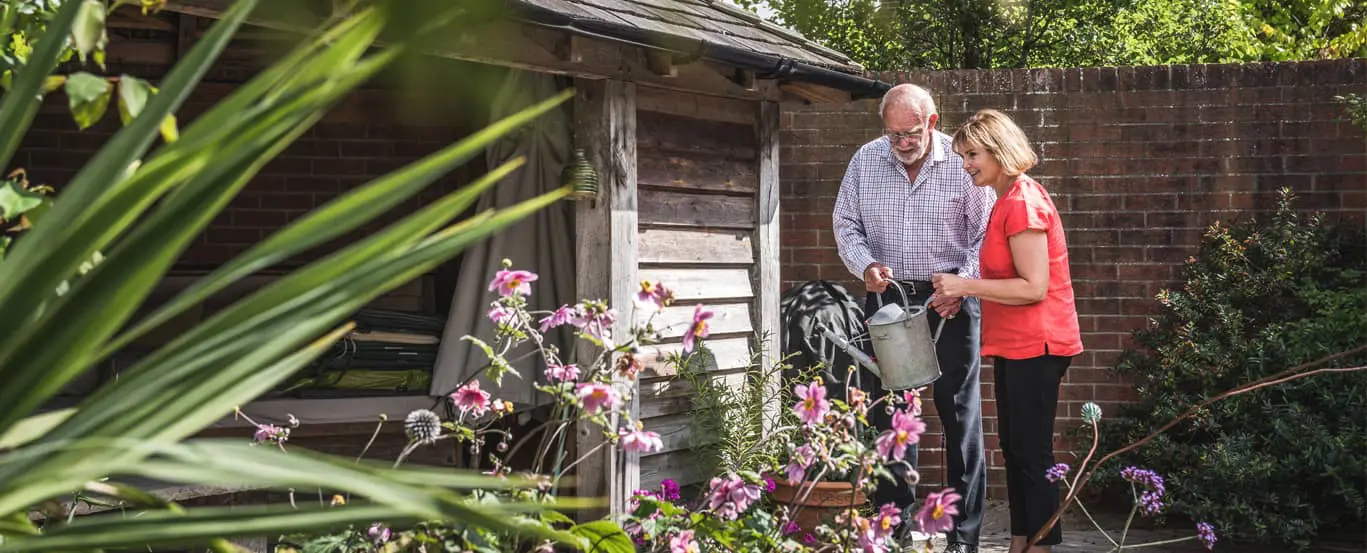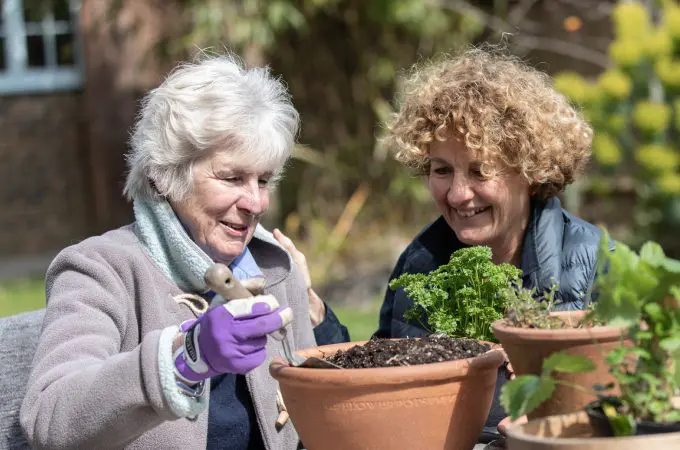Gardening holds many benefits for people of all ages, but this horticultural hobby specifically has the power to help individuals living with dementia. From getting out into the fresh air to experiencing the simple pleasure of watching plants grow, gardening offers many benefits to health and well-being.
People living with dementia are not only prone to the physical signs of the condition but also present with psychological and emotional symptoms. Gardening is well known for being an effective way to reduce stress and anxiety. For those living with dementia, being able to manage periods of stress becomes all the more important.
In this guide to gardening for individuals living with dementia, we will explore the benefits this hobby can bring to the lives of people with this condition. We will also reveal how to support people living with dementia to fully reap the benefits of this health-promoting hobby.
Can gardening help dementia?
Dementia is a progressive condition that can disrupt lives and make everyday activities more challenging. Its physical, mental, and emotional symptoms can interfere with long-standing hobbies and interests. However, staying active and involved in social or enjoyable activities is vital for people living with dementia.
Gardening can combine gentle, functional exercise with an enjoyable activity for your loved one to take part in. From exercising muscles to strengthening the body and providing cognitive stimulus, gardening has much to offer those living with dementia.

Fresh air
Engaging in gardening activities exposes people with dementia to fresh air, providing a revitalising and invigorating experience. Spending time outdoors can enhance mood, promote relaxation, and stimulate the senses, contributing to an overall sense of well-being. The gentle breeze, natural scents, and sounds of nature create a calming environment that can help reduce stress and anxiety commonly associated with dementia.
Additionally, exposure to sunlight during gardening can boost vitamin D levels, supporting physical health and promoting better sleep patterns. Overall, the opportunity to enjoy fresh air while gardening offers numerous benefits for individuals living with dementia.
Memory
Memory loss is a major symptom of dementia and can be a distressing and confusing experience. Gardens are multi sensory spaces, full of scents and sounds that can stimulate the memory. Therefore by digging around in the dirt, individuals can connect to the natural world all around them through sight, smell, touch, and even taste, if their hard work pays off.
Socialising
Gardening does not have to be a solo activity. Joining gardening groups or community classes can provide an opportunity for socialising and cognitive stimulus. Swapping gardening tips and learning together is a great way to ward off feelings of isolation and boost brain functioning.
Relaxation
Being out in the garden is a great way to relieve stress and tension. Feelings of anxiety are commonly experienced by people living with dementia, making it all the more important to find effective ways to relax. Concentrating on the task at hand can help to focus the mind on other matters and is an almost meditative practice.
Gentle exercise
The functional nature of gardening works a wide range of small and large muscle groups throughout the body. When gardening is carried out regularly, this helps keep individuals living with dementia physically fit. Not only does gardening help maintain muscle tone and provide a gentle cardio workout, but it can also improve fine motor skills and hand-eye coordination.

Tips for gardening with dementia
If your loved one living with dementia is keen to get out into the garden, here are some top tips to help get them started.
- The right tools – gardens for those living with dementia should include specially adapted tools as this can make gardening a more comfortable and accessible experience for your loved one. Dementia can affect hand grip strength and coordination so making sure your loved one has tools they can use is important.
- Seed planting – planting seeds is a great place to start as individuals can gain pleasure and a sense of achievement in watching plants grow from seedlings.
- Water feature – a water feature adds to the sensory experience of gardening. By installing a water feature for your loved one or building one together, the garden will become a multisensory haven, stimulating the senses and sparking conversation.
- Wildlife – creating a wildlife corner is another great way to encourage your loved one to connect with the natural world. An insect hotel made out of bamboo shoots, a patch of wild grass, or an undisturbed rock pile can provide the perfect habitat for all kinds of creatures.
- Routine maintenance – not only does gardening involve planting, it also requires regular maintenance, watering, and pruning. This maintenance can be woven into your loved one’s daily or weekly routine to help them work on their memory issues and give them structure to each day.
- Harvesting – if your loved one’s efforts in the garden prove fruitful, then they can enjoy picking and using their produce. Whether that involves enjoying freshly homegrown berries with yoghurt or arranging the flowers they have picked into a bouquet, harvesting brings great satisfaction.
Get involved with gardening in the UK
If your loved one does not have a garden, not to worry—they can still get involved in gardening.
Community gardens are springing up all over the UK, enabling people from local communities to grow produce together. These initiatives are ideal for beginners as they are often led by experienced community gardeners who are not only knowledgeable about gardening but can also offer specific help for older people and those with disabilities. Contact your local council to see what is available in your area.
For individuals with access to a garden, getting into the garden can start right away, with a little extra support from a family member or professional carer. Live-in care can help with facilitating all your loved one’s hobbies and interests, gathering supplies, offering transportation, and more.
Get in touch with The Good Care Group for more information on what a live-in or hourly carer can do for your loved one.
Talk to us about your dementia care needs
Our friendly and experienced team is here to help you and your family make sense of the options available to you. Call us today – we will help you every step of the way.
